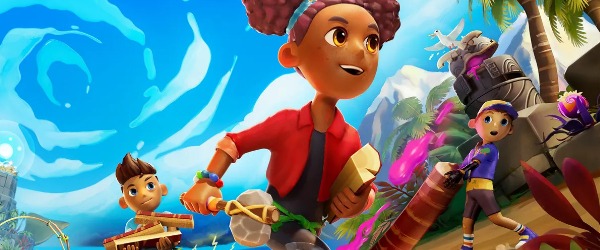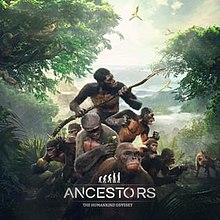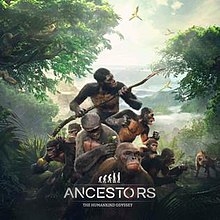
Ancestors: The Humankind Odyssey (XOne) - Review
by Lee Mehr , posted on 08 January 2020 / 4,965 ViewsHow we got here is an impressive tale. The conditions our distant ancestors faced could scarcely be believed by us today; in contrast, we get the luxury of musing about such arduous times in air-conditioned homes with fridges preserving juices and whole meals. There’s something about the concept of looking back at our collective lineage that Panache Digital Games and director Patrice Désilets (Assassin’s Creed creator) deserve respect for incorporating into Ancestors: The Humankind Odyssey. Sadly, as ambitious as Ancestors is in telling this grander tale of our precursors’ evolutionary history, it’s ironic to see a gameplay loop that feels so static and underdeveloped.

You begin with naming your lineage and selecting a male/female ape. A wonderfully-paced cutscene presents the set-up: the African jungle from ten million years ago is teeming with life. In it, we witness the savagery of the food chain in action, and your tribe isn’t outside of it. A paired baby and adult hominid are separated by the adult’s abduction and death by a giant hawk. The baby chimp finds a good hiding place and you’re tasked with the rescue. After that, you’ll reach farther beyond your initial borders to continue the tribe’s collective lineage.
That opening seems rather blunt but it's in-keeping with the game’s intentions. This isn’t about continuous blood-feuds with Templars, political machinations of your forbearers, and other complex family dynamics. Hell, it’s not even a simple narrative structure one can find in BCE stories; this is about straightforward pre-history objectives. Those goals are simple: eat, drink, sleep, mate, and try not to die. Ancestors’ story is one of abstract game systems showing our slow evolution to proto-humans, rather than an involving narrative focused on one protagonist.
What does this amount to with respect to its core identity? You’re effectively a tribe of ignorant apes who’re slowly testing the environment around in the vein of a survival action-adventure. This is managed in a multitude of different ways: inspecting certain fruits to eat, assessing the quality of water, making a bed, making two items interact with one another to craft a weapon or something else, and using your senses to mark out waypoints or items within the environment. For console versions, there's a guiding hand with dozens of tutorial pop-ups—which makes the PC release seem all the more rushed; despite that, there’s still a sense of unrestrained exploration limited only by how you manage the wildlife.

In respect of the developer focus and intent, Ancestors is quite similar to Death Stranding, with all the regrettable implications that entails. And, once again, environmental traversal can feel like a chore.
To its credit, the jungle canopy in the starting area hits a good middle-ground between spacious and dense. Similar to the Assassin’s Creed series, you’re able to climb on practically every tree and rock face. You don’t quite have the nimbleness and forward momentum of someone like Tarzan swinging through the trees, but it’s not realistic to the point of sapping all the fun either. The visceral sensation of sliding twenty feet down the base of a tree after a high jump feels satisfying.
The issues that initially feel granular build up to moments of total displeasure. For one, the directional movement and camera tend to get unwieldly when scaling trees. You may find yourself on the base of a tree, wishing to shuffle down to a jutting branch, but then, without warning, you’re climbing back up again. It’s like your controller has been possessed! I also can’t help but blame the game for some imprecise jumps that led to my character plummeting to its death. I know this’ll bring out the ‘get good’ counter-argument, but I can’t disregard what I witnessed. Those occasions of somehow not grabbing a cluster of vines (despite timely pressing the ‘A’ button) or over-correcting a jutting branch’s location resulting in death-upon-impact made me momentarily question the functionality of the controls.
This frustration extends to many tasks. Moving outside your environment is initially interesting, though. Horrifying images of snarling, red-eyed creatures are superimposed on the screen and your vision has been darkened. You either wander back to a point of safety or pick up and inspect items found in this dark, dangerous place before your dopamine levels hit zero. Examine enough stuff and eventually you’ll be able to ‘conquer your fear’ of the area, resulting in color returning and your sanity meter slowly stabilizing. The concept is fine on its own, but the execution is mishandled. The plummeting of your sanity meter is very unforgiving, and the darkened vision sometimes results in health-damaging mistakes too. So now you’re not only dealing with the unknown, but limping to a nearby tree or rock face while an over-eager tiger might also be creeping into frame. These fastidious inter-locking systems would be more appreciated if I didn’t feel like they were trying to screw me at every turn.

This ruthlessness does extend to the wildlife too. A few nature documentaries will reveal how vicious it’s been for millions of years. With that considered, it’s amazing just how fascinated Panache was with throwing tigers at you ad nauseum. It’s not game over if they’re close though. Everything slows to a Wachowski crawl as they’re about to lunge. To dodge: jam your control stick left or right and press ‘A’ when you hear an audio queue; should you mistime it, you’ll be bleeding and must mend that open wound. The design itself is simple, but some combative moments drove me bananas. An awkward position during combat left me in a buggy, near-endless loop of triggering bullet time in some special locations. Each dodge set me right next to that tiger again until I caught a lucky break.
When you learn how to craft a weapon, the effect swings heavily in the opposite direction. Wielding a sharpened stick results in performing two actions: hold the control stick forward/up and push the ‘A’ button when the audio queue occurs. This weird difficulty whiplash does emphasize the better moments of self-discovery; the issue is that the rest of the game then comes to consist of overly repetitive tasks of accrued knowledge.

The one almost-unblemished aspect of Ancestors’ gameplay is the primate’s neural network. This nuanced skill tree system is one of my favorites of recent memory for several reasons. The first would be the splendor of how the stats tie back into humanity's actual accumulation of motor skills, knowledge of flora and fauna, group communication, and so on. Seeing how many ancillary activities contribute to your stats and your genetic line hits that feedback loop quite often. Even the visual/sound design when assessing and increasing your neural stats is well-crafted. Lastly, it’s smart to ensure not all unlocked abilities for one generation instantly carry over for the next; instead, you must spend reinforcement points on specific ones to carry over. Aside from some superfluous traits to puff up the neural network’s web, credit is due for this solid template.
Ancestors’ gameplay is a case of admiration for its originality and admonition for its final results. Many of its ideals come off as ‘kitchen-sink’ design. A bunch of different fancies are considered about what it’d be like as one of our ancestors without enough consideration for the player experience alongside them. This uncompromising attitude may be something a clique of gamers are looking for: the sense of punishment, for both you and potentially your whole genetic line. But I don’t see the value in that without the countervailing amount of reward or a more thoughtful approach to the player experience.

Despite mechanical frustrations, the varied biomes are worth exploring based on the technical audio/visual design alone. Harkening back to the Assassin’s Creed series again, Ancestors harnesses similar sensations with respect to discovery and player space. The detail of Jerusalem or Florence aren’t here, but in their place is a vast jungle with tall trees, scattered swamps, and much more in a way that feels imposing. It’s not of the technical level found in AAA games (nor is it priced as such) but there is a respectable amount of liveliness to this world.
Given the setting, there’s no voice acting beyond the sequential grunts of various ape-like ancestors. Everything involving the wildlife sounds appropriate and realistic. A chief complaint I had comes back to the aural design of the OST. It’s not a bad soundtrack by any means, but playing with headphones is a total drag until you crank music volume down to fifteen or even to zero. The soundtrack’s loudness bleeds into the rest of your interactions, which makes it tough to hear the audio tick when performing certain actions in-game. I don’t understand how this, and sporadic audio issues where sound drops out, weren’t managed beforehand.

Ancestors: The Humankind Odyssey is not a game interested in holding your hand; in fact, I think it takes pleasure in quickly kicking you out of the nest. It’s an idiosyncratic game I’m able to respect the further away I am from playing it. Brevity is by no means a problem with this $40 title, as you’re looking at dozens of hours of gaming time. But it’s those hours within the game that don’t feel worth it for me. Momentary flashes of brilliance give way to often-unintuitive systems invested in being a nuisance than an engaging simulation. It's an interesting specimen that would’ve benefitted from annoying tedium and clunky controls being weeded out of its gene pool.
VGChartz Verdict
4
Poor
This review is based on a digital copy of Ancestors: The Humankind Odyssey for the XOne, provided by the publisher.






























 Essay Pro
Essay Pro